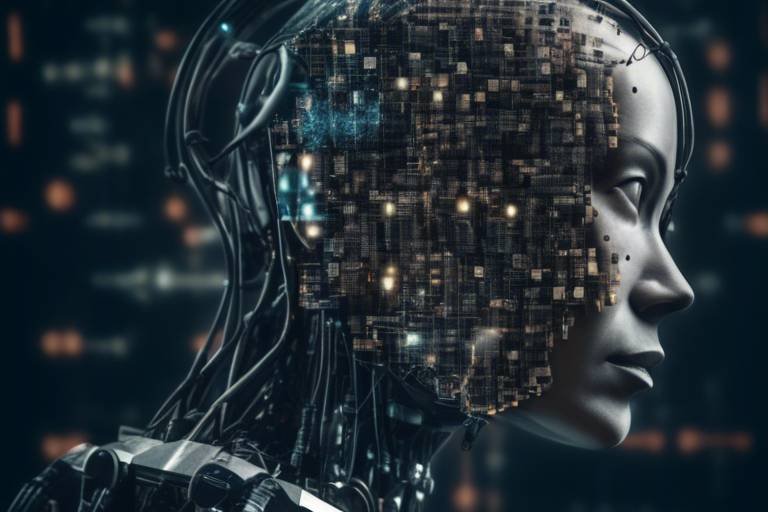Shaping Policy around AI Ethics
As we stand on the brink of a technological revolution, the intersection of artificial intelligence (AI) and ethics has become a hot topic. The rapid advancement of AI technologies is reshaping industries, influencing our daily lives, and even redefining what it means to be human. However, with great power comes great responsibility. This is where the need for comprehensive policies around AI ethics comes into play. It's not just about creating smarter machines; it's about ensuring that these machines are developed and deployed in ways that are ethical, fair, and beneficial to society as a whole.
Imagine a world where AI systems make decisions that impact our lives, from hiring practices to healthcare diagnostics. If these systems are not guided by ethical considerations, we risk creating a future where bias, discrimination, and privacy violations become the norm rather than the exception. Therefore, shaping policy around AI ethics is not merely a bureaucratic exercise; it is a crucial step towards safeguarding our values and rights in an increasingly automated world.
To effectively shape these policies, we need to recognize the multifaceted nature of AI ethics. This involves understanding the importance of AI ethics, addressing current ethical challenges, and developing frameworks that promote accountability. The policies we create must not only reflect our societal values but also be adaptable to the fast-paced evolution of AI technologies. This requires a collaborative approach, engaging stakeholders from various sectors including technology, law, social sciences, and ethics.
Ultimately, the goal is to foster an environment where innovation can thrive while ensuring that AI serves humanity's best interests. By proactively addressing ethical concerns, we can pave the way for a future where AI enhances our lives, rather than complicates them. In this article, we will delve deeper into the significance of AI ethics, the challenges we face, and the steps we can take to create a more equitable and just technological landscape.
Understanding the significance of AI ethics is crucial as it lays the foundation for responsible innovation, ensuring that AI technologies align with societal values and human rights. In a world where algorithms can influence everything from our shopping habits to our job prospects, the ethical implications of AI cannot be overlooked. When we talk about AI ethics, we are essentially discussing how to create systems that respect human dignity and promote fairness. This is not just a technical issue; it's a moral imperative.
AI technologies face numerous ethical dilemmas, including bias, privacy concerns, and accountability, which necessitate urgent attention to create fair and transparent systems. These challenges are not just theoretical; they have real-world implications that can affect millions of lives. For instance, biased algorithms can lead to unfair treatment in hiring processes or law enforcement, while inadequate privacy protections can expose sensitive personal information to misuse.
Bias in algorithms can lead to unfair outcomes, disproportionately affecting marginalized groups, thus highlighting the need for equitable data practices and algorithmic transparency. When AI systems are trained on biased data, they learn and perpetuate those biases, often without any awareness of the injustice they are enacting. It's akin to teaching a child a skewed version of history; the consequences can be profound and long-lasting.
Identifying bias in AI systems requires robust methodologies to evaluate data and algorithms, ensuring that they do not perpetuate discrimination or inequality. This involves not just technical assessments but also engaging with affected communities to understand their experiences and perspectives. By adopting a more inclusive approach, we can better detect and address biases before they cause harm.
Implementing strategies to mitigate bias involves diverse data collection, inclusive design processes, and continuous monitoring of AI systems to promote fairness. This is not a one-time fix but an ongoing commitment to ethical practices. Organizations must be willing to invest time and resources into ensuring that their AI systems are fair and just.
Privacy concerns are paramount in AI ethics, as the collection and use of personal data raise questions about consent, security, and individual rights. In today's digital age, our data is often collected without our explicit consent, leading to a growing mistrust of technology. Policies must be established to protect individuals' rights while balancing the need for data to train and improve AI systems.
Establishing accountability in AI development is critical to ensure that creators and organizations are responsible for the impacts of their technologies on society. This means creating clear guidelines that outline who is responsible when an AI system causes harm or makes a mistake. Without accountability, we risk a future where no one is held responsible for the consequences of AI decisions.
Developing effective regulatory frameworks can provide guidelines for ethical AI practices, balancing innovation with societal interests and protecting public welfare. These frameworks should be flexible enough to adapt to new technologies while ensuring that ethical considerations remain at the forefront of AI development.
Examining diverse global perspectives on AI ethics can enrich policy discussions, ensuring that solutions are culturally sensitive and applicable across different contexts. AI is a global phenomenon, and its implications are felt worldwide. By incorporating various viewpoints, we can develop more comprehensive and effective policies that respect cultural differences while promoting universal ethical standards.
- What is AI ethics? AI ethics refers to the moral principles that guide the development and deployment of artificial intelligence technologies.
- Why is AI ethics important? AI ethics is crucial to ensure that AI technologies are developed responsibly, protecting individual rights and promoting fairness.
- What are the main ethical challenges in AI? Key challenges include bias in algorithms, privacy concerns, and the need for accountability.
- How can bias in AI be mitigated? Mitigating bias involves diverse data collection, inclusive design processes, and ongoing monitoring of AI systems.
- What role do regulatory frameworks play in AI ethics? Regulatory frameworks provide guidelines for ethical AI practices and help balance innovation with societal interests.

The Importance of AI Ethics
This article explores the intricate relationship between artificial intelligence and ethics, emphasizing the need for comprehensive policies to guide the responsible development and deployment of AI technologies.
Understanding the significance of AI ethics is crucial as it lays the foundation for responsible innovation. Imagine a world where technology evolves faster than our ability to manage its impact on society. That's the reality we face today. Without a robust ethical framework, we risk creating systems that not only fail to meet our societal values but also infringe upon human rights. AI ethics serves as our guiding star, steering us away from potential pitfalls and towards a future where technology enhances rather than undermines our lives.
At its core, AI ethics is about ensuring that the technologies we develop are not just effective, but also fair and just. It is imperative for organizations to recognize that their AI systems can have profound implications on individuals and communities. For instance, an AI-driven hiring tool that favors certain demographics over others can perpetuate existing inequalities. This is where ethics comes into play, urging us to ask the tough questions: Are we prioritizing efficiency over equity? Are we considering the long-term effects of our technological choices?
Moreover, AI ethics encourages a culture of transparency and accountability. By embedding ethical considerations into the design and deployment of AI systems, we foster trust among users and stakeholders. This trust is essential, especially as AI technologies become more integrated into our daily lives. When individuals feel confident that their data is handled responsibly and that decision-making processes are clear, they are more likely to embrace AI innovations.
To illustrate the importance of AI ethics, consider the following key principles that should guide AI development:
- Fairness: Ensuring that AI systems do not discriminate against any group.
- Transparency: Making AI decision-making processes understandable and accessible.
- Accountability: Holding developers and organizations responsible for the outcomes of their AI systems.
- Privacy: Protecting individuals' personal data and ensuring consent is obtained.
In a world increasingly shaped by AI, the need for ethical guidelines cannot be overstated. By prioritizing AI ethics, we not only protect vulnerable populations but also enhance the overall effectiveness of AI technologies. When ethical considerations are at the forefront, we pave the way for innovations that uplift society, rather than divide it. The challenge lies ahead, but with a commitment to ethical principles, we can navigate the complexities of AI responsibly.
AI technologies face numerous ethical dilemmas, including bias, privacy concerns, and accountability, which necessitate urgent attention to create fair and transparent systems.
Bias in algorithms can lead to unfair outcomes, disproportionately affecting marginalized groups, thus highlighting the need for equitable data practices and algorithmic transparency.
Identifying bias in AI systems requires robust methodologies to evaluate data and algorithms, ensuring that they do not perpetuate discrimination or inequality.
Implementing strategies to mitigate bias involves diverse data collection, inclusive design processes, and continuous monitoring of AI systems to promote fairness.
Privacy concerns are paramount in AI ethics, as the collection and use of personal data raise questions about consent, security, and individual rights.
Establishing accountability in AI development is critical to ensure that creators and organizations are responsible for the impacts of their technologies on society.
Developing effective regulatory frameworks can provide guidelines for ethical AI practices, balancing innovation with societal interests and protecting public welfare.
Examining diverse global perspectives on AI ethics can enrich policy discussions, ensuring that solutions are culturally sensitive and applicable across different contexts.
- What is AI ethics?
AI ethics refers to the moral principles and guidelines that govern the development and use of artificial intelligence technologies.
- Why is AI ethics important?
It ensures that AI technologies are developed responsibly, aligning with societal values and protecting individual rights.
- What are some challenges in AI ethics?
Key challenges include algorithmic bias, privacy concerns, and the need for accountability in AI systems.

Current Ethical Challenges in AI
The rapid advancement of artificial intelligence (AI) technologies brings with it a host of ethical challenges that we must confront head-on. As AI becomes increasingly integrated into various aspects of our lives—from healthcare to finance, and even social interactions—it raises critical questions about fairness, privacy, and accountability. These challenges are not merely theoretical; they have real-world implications that can affect individuals and communities alike. For instance, consider how AI systems are used in hiring processes or law enforcement. The potential for bias and discrimination is not just a possibility; it is a tangible risk that can lead to significant societal harm.
One of the most pressing issues is algorithmic bias. AI algorithms are often trained on historical data, which may contain biases reflecting past injustices. This can result in systems that unfairly disadvantage certain groups, particularly marginalized communities. For example, if a hiring algorithm is trained on data from a company that has historically favored a particular demographic, it may continue to perpetuate that bias, effectively locking out qualified candidates from diverse backgrounds. The implications of such biases can be profound, leading to a lack of diversity in workplaces and reinforcing existing societal inequalities.
Another significant challenge is privacy and data protection. As AI systems require vast amounts of personal data to function effectively, the question of how this data is collected, stored, and used becomes increasingly critical. Are individuals truly giving informed consent when they share their data? Are their rights being protected? The reality is that many people are unaware of how their information is being utilized, leading to a growing sense of unease regarding data security and personal privacy. This is particularly concerning in sectors such as healthcare, where sensitive information can be mishandled or exploited.
Moreover, the lack of accountability in AI systems poses another ethical dilemma. When an AI system makes a mistake—whether it’s misdiagnosing a patient or incorrectly flagging a potential criminal—who is responsible? Is it the developers, the organization using the technology, or the AI itself? Without clear lines of accountability, it becomes challenging to address grievances and ensure that affected parties receive justice. This uncertainty can erode public trust in AI technologies, hindering their potential benefits.
To tackle these ethical challenges effectively, it’s essential to establish comprehensive frameworks that guide the development and deployment of AI technologies. This includes implementing regulatory measures that prioritize ethical considerations, promote transparency, and ensure that AI systems are designed with fairness in mind. Additionally, fostering a culture of inclusive design—where diverse voices are included in the development process—can help mitigate biases and create more equitable technologies.
In conclusion, the current ethical challenges in AI are complex and multifaceted. Addressing these issues requires a collective effort from technologists, policymakers, and society as a whole. By prioritizing ethics in AI development, we can ensure that these powerful tools serve to enhance human well-being rather than undermine it.
- What is algorithmic bias? Algorithmic bias refers to systematic and unfair discrimination that occurs in AI systems due to biased data or flawed algorithms.
- How can we protect privacy in AI? Protecting privacy in AI involves implementing strict data protection policies, ensuring informed consent, and using secure data storage methods.
- Who is responsible for AI mistakes? Accountability in AI is complex; it can involve developers, organizations, or even regulatory bodies depending on the context of the mistake.
- What can be done to mitigate bias in AI? Strategies include diverse data collection, inclusive design processes, and ongoing monitoring of AI systems to promote fairness.

Bias in AI Algorithms
When we talk about , we’re diving into a topic that is as complex as it is crucial. Imagine a world where decisions about our lives—like hiring for a job, getting a loan, or even being considered for a promotion—are made by a machine that has learned from flawed data. Scary, right? Bias in AI can lead to outcomes that are not only unfair but also damaging, particularly to marginalized communities. It’s like having a referee in a game who consistently favors one team over another; the outcome is skewed, and the integrity of the game is compromised.
The root of the problem often lies in the data used to train these algorithms. If that data reflects historical inequalities or prejudices, the AI is likely to replicate those biases. For instance, if an algorithm is trained on data that has a history of underrepresenting certain groups, it may inadvertently continue that trend, leading to decisions that reinforce existing disparities. This phenomenon is not just theoretical; it has real-world implications that can affect people's lives in significant ways.
To truly grasp the magnitude of this issue, we need to consider a few key factors:
- Data Quality: Poor-quality data can lead to biased outcomes. If the data is incomplete or unrepresentative, the AI's decisions will reflect those shortcomings.
- Algorithm Design: The way algorithms are constructed can introduce bias. If the design process lacks diversity, the resulting AI may not account for various perspectives.
- Feedback Loops: AI systems can create feedback loops that perpetuate bias. For example, if a biased system is used in hiring, it might only select candidates who fit a narrow profile, further entrenching bias.
So, how do we tackle this issue? It starts with detecting algorithmic bias. Organizations need to implement robust methodologies to evaluate their data and algorithms. This means regularly auditing AI systems to ensure they do not perpetuate discrimination or inequality. Think of it as a health check-up for your algorithms—just like we check our bodies for potential issues, we need to check our AI systems for biases that could lead to harmful outcomes.
Moreover, mitigating bias requires a proactive approach. It involves several strategies, such as:
- Collecting diverse data that represents various demographics.
- Engaging in inclusive design processes that involve stakeholders from different backgrounds.
- Continuously monitoring AI systems to ensure they adapt to changing societal norms and values.
Ultimately, addressing bias in AI algorithms is not just a technical challenge; it’s a moral imperative. We must strive for fairness and justice in our technological advancements, ensuring that AI serves as a tool for equality rather than a perpetuator of past injustices. As we move forward, it’s essential to keep asking ourselves: Are we building algorithms that reflect our values? Are we doing enough to ensure that every voice is heard in the process?
- What is bias in AI algorithms? Bias in AI algorithms refers to the tendency of AI systems to produce unfair outcomes due to flawed data or design processes that do not consider diverse perspectives.
- How can bias in AI be detected? Bias can be detected through regular audits, testing algorithms with diverse datasets, and employing methodologies that evaluate the fairness of AI systems.
- What steps can be taken to mitigate bias in AI? Steps include collecting diverse data, engaging in inclusive design processes, and continuously monitoring AI systems for fairness.

Detecting Algorithmic Bias
Detecting algorithmic bias is a critical step in ensuring that artificial intelligence systems function fairly and justly. Bias can seep into AI algorithms in various ways, often originating from the data they are trained on. When we think about it, it's like teaching a child using only a limited set of examples; their understanding will be skewed based on what they've been shown. Similarly, AI systems can develop biased perspectives if they are fed incomplete or unrepresentative data. Therefore, it's essential to implement robust methodologies that scrutinize both the data and the algorithms themselves.
One effective approach to detecting bias is through data audits. This involves a thorough examination of the datasets used for training AI models. By analyzing the demographic representation within these datasets, we can uncover potential disparities. For instance, if an AI system is designed to recognize faces but is trained predominantly on images of one ethnic group, it may struggle to accurately identify individuals from other backgrounds. This is a prime example of how bias can manifest in technology, leading to real-world consequences.
Another method for detecting algorithmic bias is through algorithmic testing. This involves running the AI system through various scenarios to observe its decision-making processes. By comparing outcomes across different demographic groups, we can identify whether certain groups are unfairly disadvantaged. This testing can be likened to a quality control process in manufacturing; just as we wouldn't want defective products hitting the market, we must ensure that AI systems are not producing biased results.
To facilitate this process, organizations can adopt a set of best practices that include:
- Establishing clear metrics for fairness
- Utilizing diverse datasets that reflect the population accurately
- Engaging external auditors to provide an unbiased review of the algorithms
- Implementing continuous monitoring to catch biases that may develop over time
Ultimately, the goal of detecting algorithmic bias is to create AI systems that are not only effective but also equitable. By prioritizing fairness and transparency, we can build trust in these technologies and ensure they serve all members of society justly. As we move forward in the AI landscape, the importance of rigorous bias detection cannot be overstated; it is a fundamental aspect of ethical AI development.
What is algorithmic bias?
Algorithmic bias refers to systematic and unfair discrimination that can occur in AI systems due to biased data or flawed algorithms, leading to unequal treatment of different demographic groups.
How can we detect algorithmic bias?
Detecting algorithmic bias involves conducting data audits to analyze the demographic representation in training datasets and algorithmic testing to observe decision-making processes across different groups.
Why is it important to address algorithmic bias?
Addressing algorithmic bias is crucial to ensure fairness, equity, and trust in AI systems, as biased outcomes can have significant negative impacts on individuals and communities.

Mitigating Bias in AI
Mitigating bias in artificial intelligence is not just a technical challenge; it’s a moral imperative. As we navigate through the complexities of AI technologies, we must recognize that the data we feed into these systems can often reflect societal prejudices. Therefore, the first step in addressing bias is to ensure that data collection practices are equitable and representative of all demographics. This means actively seeking out diverse data sources to create a more balanced dataset that does not favor one group over another.
In addition to diverse data collection, the design process of AI systems should be inclusive. This involves involving a variety of stakeholders in the development phase, including those from marginalized communities. By doing so, we can gain insights into potential biases that may not be immediately apparent to developers who may not share the same experiences. It’s akin to cooking a meal without tasting it; you might end up with something unpalatable if you don’t check in with others along the way!
Moreover, continuous monitoring of AI systems is essential to promote fairness. Once an AI model is deployed, it should not be left to run unchecked. Instead, organizations should implement regular audits to assess the performance of AI systems and identify any emerging biases. This could involve setting up a feedback loop where users can report unexpected behaviors or outcomes. By keeping a pulse on how AI interacts with real-world data, we can make necessary adjustments and corrections, much like tuning a musical instrument until it plays just right.
Another effective strategy is to employ algorithmic transparency. This means making the workings of AI systems understandable to users and stakeholders. When people can see how decisions are made, it fosters trust and accountability. For instance, if an AI system is used in hiring processes, candidates should be informed about how their applications are evaluated. Transparency can also facilitate discussions around bias, allowing for collaborative efforts to refine algorithms and improve fairness.
In summary, mitigating bias in AI requires a multifaceted approach that encompasses equitable data practices, inclusive design, continuous monitoring, and algorithmic transparency. By taking these steps, we can work towards creating AI systems that are not only innovative but also just and fair. Remember, the goal is not just to avoid bias but to actively promote equity in the digital age.
- What is AI bias? AI bias refers to the systematic and unfair discrimination that can occur when AI systems make decisions based on flawed or unrepresentative data.
- How can we detect bias in AI? Detecting bias involves evaluating the data and algorithms used in AI systems through rigorous testing and analysis to ensure they do not perpetuate discrimination.
- Why is diversity important in AI development? Diversity in AI development helps to create more inclusive systems that consider the needs and perspectives of various groups, reducing the risk of bias.
- What role does transparency play in AI ethics? Transparency allows stakeholders to understand how AI systems operate, fostering trust and enabling collaborative efforts to address biases.

Privacy and Data Protection
When we think about artificial intelligence, one of the first things that come to mind is the vast amount of data it processes. This data often includes sensitive personal information, raising significant privacy concerns that cannot be ignored. In a world where data is the new oil, the ethical implications surrounding its collection and use are profound. How do we ensure that individuals' rights are respected while still harnessing the power of AI? This is a question that demands our attention.
At the heart of privacy and data protection in AI ethics is the concept of informed consent. Individuals should have a clear understanding of what data is being collected, how it will be used, and who will have access to it. Unfortunately, many organizations often bury this information in lengthy terms and conditions, leaving users in the dark. It’s akin to giving someone a treasure map but not telling them that the treasure is their own personal information!
Furthermore, there is the issue of data security. With the increasing number of data breaches and cyberattacks, the need for robust security measures has never been more critical. Companies must implement stringent protocols to protect users' data from unauthorized access. A single breach can not only harm individuals but also erode public trust in AI technologies. After all, if we can’t trust these systems to keep our information safe, why would we want to use them?
To tackle these challenges effectively, we need to establish a framework that prioritizes privacy and data protection. This framework should encompass the following key elements:
- Transparency: Organizations must be transparent about their data practices, making it easy for users to understand how their data is used.
- Accountability: There should be clear accountability for organizations that fail to protect personal data, with penalties for breaches.
- Data Minimization: Collecting only the data necessary for a specific purpose can reduce the risk of misuse.
- User Empowerment: Users should have the ability to control their data, including the right to access, modify, or delete it.
Moreover, as AI technologies continue to evolve, so too must our approaches to privacy and data protection. It’s essential to engage in ongoing dialogue about these issues, ensuring that policies adapt to the changing landscape of technology. This means not only involving technologists and ethicists but also incorporating voices from diverse communities who may be disproportionately affected by data practices.
In summary, the intersection of AI, privacy, and data protection is a complex but crucial area that requires careful consideration. By prioritizing ethical practices and establishing a solid framework for data protection, we can pave the way for AI technologies that respect individual rights while still delivering on their potential. It’s a balancing act, but one that is essential for the future of technology and society.
Q1: Why is privacy important in AI?
A1: Privacy is crucial in AI because it involves the handling of sensitive personal information. Protecting this information helps maintain user trust and ensures compliance with legal standards.
Q2: What are the main privacy concerns with AI?
A2: The main privacy concerns include data collection without consent, potential misuse of personal information, and the risk of data breaches.
Q3: How can organizations ensure data protection in AI?
A3: Organizations can ensure data protection by implementing transparent data practices, enforcing strict security measures, and allowing users to control their data.

Accountability in AI Systems
In the rapidly evolving landscape of artificial intelligence, establishing accountability is not just a matter of ethical practice; it is a necessity for fostering trust and ensuring the responsible use of AI technologies. As AI systems become more integrated into our daily lives, from healthcare to finance, the question arises: who is responsible when these systems fail or cause harm? This is a critical issue that demands our attention, as the implications of AI decisions can significantly impact individuals and society as a whole.
To navigate the complexities of accountability in AI, we must first understand that accountability is not solely about assigning blame. Rather, it encompasses a broader framework that includes transparency, responsibility, and the ability to audit AI systems. When we talk about accountability, we are essentially asking for a system where stakeholders—be it developers, organizations, or even governments—are held responsible for the outcomes produced by AI technologies. This creates a culture of responsibility, where everyone involved is aware of their role in ensuring that AI serves the public good.
One of the primary challenges in establishing accountability in AI systems lies in their inherent complexity. AI technologies often operate as "black boxes," making it difficult to trace the decision-making processes behind their outputs. This opacity can lead to a lack of trust among users and stakeholders. To counter this, we need to implement robust regulatory frameworks that mandate transparency in AI development and deployment. These frameworks should include:
- Clear guidelines for documenting AI algorithms and their decision-making processes.
- Regular audits to assess the performance and fairness of AI systems.
- Stakeholder involvement in the development process to ensure diverse perspectives are considered.
Moreover, accountability should extend beyond just the developers and organizations. Users of AI systems also have a role to play. Educating users about the capabilities and limitations of AI can empower them to make informed decisions and hold creators accountable. For instance, if a healthcare AI system provides a diagnosis that leads to adverse outcomes, patients and healthcare providers should have the knowledge to question the AI's recommendations and seek clarification about its decision-making process.
Additionally, the creation of an independent oversight body could serve as a crucial mechanism for accountability. This body would be responsible for monitoring AI systems, investigating complaints, and ensuring compliance with ethical standards. By having an impartial entity oversee AI technologies, we can foster greater public trust and ensure that AI is developed and used responsibly.
Ultimately, accountability in AI systems is about building a framework that encourages ethical practices while promoting innovation. As we continue to develop and deploy these powerful technologies, we must prioritize accountability to protect individuals and society from potential harms. By doing so, we can harness the full potential of AI while ensuring that it aligns with our collective values.
- What is accountability in AI? Accountability in AI refers to the responsibility of developers and organizations to ensure that their AI systems operate ethically and transparently, with mechanisms in place to address any negative outcomes.
- Why is accountability important in AI? Accountability is crucial to build trust in AI technologies, ensuring that they are used responsibly and that stakeholders are held responsible for their impacts on society.
- How can we ensure accountability in AI systems? We can ensure accountability through regulatory frameworks, transparency in AI processes, regular audits, and the involvement of diverse stakeholders in the development of AI technologies.

Regulatory Frameworks for AI
As we navigate the rapidly evolving landscape of artificial intelligence, the establishment of regulatory frameworks becomes increasingly essential. These frameworks serve as the backbone of responsible AI development, ensuring that innovation does not come at the expense of ethical considerations. Think of regulations as guardrails on a winding mountain road; they help keep us on track while allowing for exploration and growth. Without them, we risk veering off into dangerous territory where biases, privacy violations, and accountability issues flourish.
One of the primary objectives of regulatory frameworks is to create a balanced approach that fosters innovation while safeguarding public interests. This dual focus is crucial because, on one hand, we want to encourage the development of groundbreaking technologies that can improve lives and drive economic growth. On the other hand, we must protect individuals from potential harms that could arise from unchecked AI applications. This delicate balancing act requires collaboration among various stakeholders, including governments, industry leaders, academics, and civil society.
Regulatory bodies around the world are beginning to recognize the need for comprehensive policies that address the unique challenges posed by AI. For instance, the European Union has taken significant steps by proposing the AI Act, which aims to classify AI systems based on their risk levels and impose specific requirements accordingly. This proactive approach is a beacon for other regions, illustrating how regulations can be tailored to the complexities of AI technologies.
To effectively develop these frameworks, several key components must be considered:
- Risk Assessment: Understanding the potential risks associated with various AI applications is vital. This involves evaluating how AI systems may impact privacy, security, and social equity.
- Transparency: Regulations should mandate transparency in AI operations, ensuring that algorithms are explainable and that users understand how their data is used.
- Accountability Mechanisms: Establishing clear accountability for AI developers and organizations is crucial. This includes defining who is responsible for the outcomes of AI systems and how they can be held accountable.
- Stakeholder Engagement: Engaging a diverse range of stakeholders in the regulatory process ensures that various perspectives are considered, leading to more effective and inclusive policies.
Moreover, the global nature of AI technology necessitates international cooperation in regulatory efforts. As AI transcends borders, harmonizing regulations can help prevent regulatory arbitrage, where companies move operations to jurisdictions with lax regulations. Collaborative efforts can also enhance the sharing of best practices and lessons learned, ultimately leading to more robust frameworks.
In conclusion, the development of regulatory frameworks for AI is not just about imposing restrictions; it’s about creating an environment where innovation and ethical considerations coexist. By establishing clear guidelines and fostering collaboration among stakeholders, we can pave the way for AI technologies that not only push the boundaries of what’s possible but also respect and uphold our shared values.
- What are regulatory frameworks for AI?
Regulatory frameworks for AI are sets of guidelines and rules designed to govern the development and deployment of artificial intelligence technologies, ensuring they are used ethically and responsibly. - Why are regulatory frameworks necessary for AI?
They are necessary to mitigate risks associated with AI, such as bias, privacy violations, and accountability issues, while promoting innovation and public trust. - How can stakeholders contribute to AI regulation?
Stakeholders can contribute by participating in discussions, providing insights based on their experiences, and advocating for inclusive policies that reflect diverse perspectives. - What is the role of international cooperation in AI regulation?
International cooperation is crucial to harmonize regulations across borders, preventing regulatory arbitrage and promoting the sharing of best practices in AI governance.

Global Perspectives on AI Ethics
In our increasingly interconnected world, the conversation around AI ethics is not confined to a single culture or nation. Instead, it spans the globe, reflecting a rich tapestry of perspectives that can greatly enhance our understanding of ethical AI development. Each region brings its unique values, challenges, and priorities to the table, shaping how AI technologies are perceived and regulated. For instance, in Europe, the emphasis is heavily on privacy and data protection, largely influenced by the General Data Protection Regulation (GDPR). This regulation sets a high standard for individual rights, compelling companies to be transparent about how they use personal data. On the other hand, countries like China prioritize technological advancement and surveillance, often at the expense of individual privacy. This dichotomy raises important questions: How do we balance innovation with ethical considerations? Can we find a middle ground that respects diverse cultural values while promoting responsible AI development?
Moreover, the ethical implications of AI are not just theoretical; they have real-world consequences that can affect millions. In regions where economic inequality is rampant, like parts of Africa, the introduction of AI could either exacerbate existing disparities or provide new opportunities for growth and development. Here, the conversation often revolves around how AI can be harnessed to improve access to education, healthcare, and economic opportunities. The challenge lies in ensuring that these technologies are implemented in a way that benefits everyone, rather than a select few.
To illustrate the varying global perspectives, consider the following table that outlines some key ethical focuses across different regions:
| Region | Key Ethical Focus | Examples |
|---|---|---|
| North America | Innovation vs. Regulation | Debates on AI in healthcare and autonomous vehicles |
| Europe | Privacy and Data Protection | GDPR and strict data usage policies |
| China | Surveillance and Control | Social credit systems and AI in public safety |
| Africa | Development and Equity | AI for agriculture and healthcare access |
These diverse perspectives not only highlight the complexities of AI ethics but also underscore the importance of inclusive dialogue. By engaging stakeholders from various backgrounds—policymakers, technologists, ethicists, and communities—we can foster a more holistic approach to AI governance. This collaboration is essential for developing ethical frameworks that are adaptable and sensitive to local contexts while also maintaining a global standard for responsible AI use.
Furthermore, as we look to the future, it is crucial to recognize that AI ethics is not a static field. It is continually evolving, influenced by technological advancements and societal shifts. For example, the rise of generative AI has sparked new ethical debates around creativity, ownership, and misinformation. By remaining open to global perspectives, we can better navigate these challenges and ensure that AI serves as a tool for good, promoting fairness, accountability, and respect for human rights across the globe.
- What is AI ethics? AI ethics refers to the moral principles and guidelines that govern the development and use of artificial intelligence technologies.
- Why is global perspective important in AI ethics? Different cultures have unique values and challenges, and understanding these perspectives helps create more effective and inclusive AI policies.
- How can we mitigate bias in AI systems? By implementing diverse data collection methods, inclusive design processes, and continuous monitoring, we can reduce bias in AI.
- What role do regulations play in AI ethics? Regulations provide a framework for ethical AI practices, ensuring that innovation aligns with societal interests and public welfare.
Frequently Asked Questions
- What is AI ethics and why is it important?
AI ethics refers to the moral principles and guidelines that govern the development and use of artificial intelligence technologies. It's crucial because it ensures that AI systems are created and implemented in ways that respect human rights, promote fairness, and align with societal values. Without a solid ethical foundation, AI could lead to harmful consequences, such as discrimination or invasion of privacy.
- What are some common ethical challenges faced by AI?
AI technologies encounter several ethical dilemmas, including bias in algorithms, privacy concerns, and issues of accountability. These challenges require urgent attention to develop fair, transparent, and responsible AI systems that serve the best interests of society.
- How does bias in AI algorithms affect society?
Bias in AI algorithms can result in unfair outcomes, often disproportionately impacting marginalized groups. This can perpetuate existing inequalities and create new forms of discrimination, which is why it's essential to implement equitable data practices and ensure algorithmic transparency.
- What steps can be taken to mitigate bias in AI?
To combat bias in AI, organizations can adopt strategies such as diverse data collection, inclusive design processes, and ongoing monitoring of AI systems. These practices help promote fairness and ensure that AI technologies serve all segments of society equitably.
- Why are privacy and data protection critical in AI ethics?
Privacy and data protection are vital in AI ethics because the collection and use of personal data raise significant questions about consent, security, and individual rights. Ensuring that people's data is handled responsibly is essential to maintain trust in AI technologies.
- How can accountability be established in AI systems?
Establishing accountability in AI development involves creating clear guidelines that hold creators and organizations responsible for the societal impacts of their technologies. This can be achieved through effective regulatory frameworks that balance innovation with public welfare.
- What role do regulatory frameworks play in AI ethics?
Regulatory frameworks provide essential guidelines for ethical AI practices. They help to ensure that the development and deployment of AI technologies are conducted responsibly, balancing innovation with societal interests and protecting public welfare.
- How do global perspectives enhance discussions on AI ethics?
Examining diverse global perspectives on AI ethics enriches policy discussions by ensuring that solutions are culturally sensitive and applicable across different contexts. This approach helps to create more comprehensive and effective ethical guidelines for AI technologies worldwide.



















